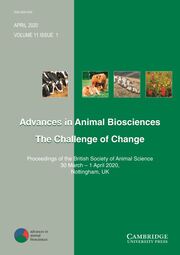This issue of Advances in Animal Biosciences includes papers from two sessions organized by the European Federation of Animal Science (EAAP) Cattle Network Working Group at the last EAAP Annual meeting in Belfast last year, and entitled “Improving the quality and sustainability of beef production’.
The EAAP Cattle Network Working Group was established in order to target exchanges between research and the industry in the whole cattle sector (dairy and beef).
Its main aims are as follows:
-
∙ Monitor and discuss trends in production and consumption of cattle products and policy measures affecting the cattle sector.
-
∙ Analyze the sustainability of cattle farming in order to ensure the meeting of market and society demand and consumers’ preferences for quality and safe food, contributing to rural employment, maintaining landscape and ensuring environment management.
-
∙ Give common and standardized tools to present and describe farm management.
This special issue of Advances in Animal Biosciences concerns only beef. Phenotyping important (novel) traits, optimizing the work and sharing the added value along the beef chain and guaranteeing beef quality and composition are essential for the future of the beef sector. This subject of beef production is of great interest for different reasons. The first one is that the meat demand in the world is growing while in developed countries, it is decreasing. In addition, it is important that beef producers have reasonable economic situation to live properly from their work. The industry is also aware of a need to meet consumer expectations for consistent and high-quality beef. Now, the issue is indeed to offer good quality and nutritious beef. Furthermore, there are environmental and animal welfare concerns regarding beef production. To summarize, the beef industry is currently facing unprecedented challenges, with issues relating to added value, environmental impact, animal welfare, nutritional benefits and consistency of eating quality.
Several means do exist to achieve these goals. They include identification of genomic regions related to quality traits and genetic variability among breeds. They also include the nutritional efficiency of animals depending on genotypes, nature of the diets (pasture, concentrate, supplements, etc.). Reproduction performances are also key factors to ensure profitability of beef production. In terms of beef quality, different methods do exist to assess them, and these quality traits are affected by animal age and/or weight, animal type (sex, breed, etc.) which in turn regulate muscle biochemical composition. At the end, consumers buy beef and their willingness to pay for good quality beef is also essential. All these items do contribute to the sustainability of beef production, and they have been also addressed in different meetings for instance, in Milan early 2017 (https://www.afbini.gov.uk/news/industry-and-scientists-meet-milan-address-beef-questions-afbi-led-workshop). Other EAAP sessions will also be organized in the future (for instance, at the next EAAP meeting in Tallinn, Estonia) on the same topic regarding the whole cattle sector (beef and dairy).
Papers dealing with all aspects of sustainable beef production, quality and supply from producers to consumers are published in this special issue. In addition, three invited speakers have presented review papers. Dr Linda Farmer from AFBI (Northern Ireland) presented a talk entitled ‘Beef eating quality – a European journey’ and Dr Sarah Bonny affiliated to Murdoch University (Australia) and INRA (France) has argued that ‘The variability of European beef can be reduced by predicting consumer satisfaction’. Finally, Dr N.D. Scollan from Queen’s University Belfast (Northern Ireland) has given a talk entitled ‘Improving efficiency and reducing waste in the beef supply chain’.
We thank all the authors, reviewers and contributors to this special issue and especially staff from Advances in Animal Biosciences for their support. We wish to thank EAAP for financial support in the production of these proceedings.

